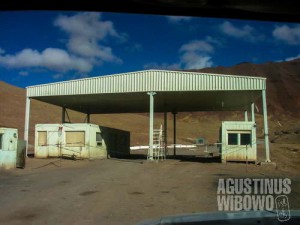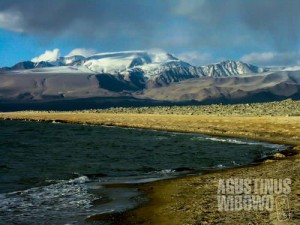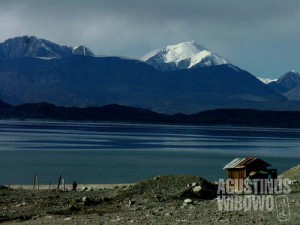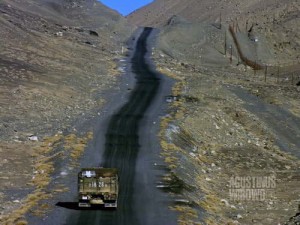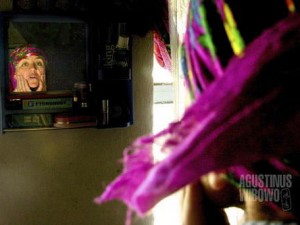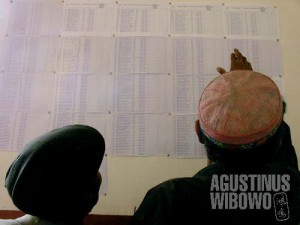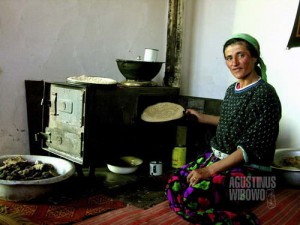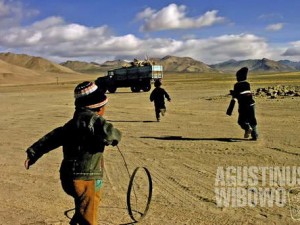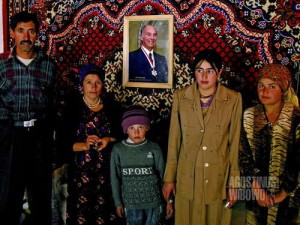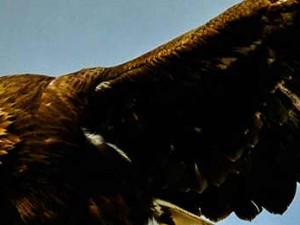Grand Overland Voyage (2005-2009)
Uyghur laghman restaurant in Osh Osh, the second city of Kyrgyzstan, is a complete drastic shock after the GBAO of Tajikistan. The city is prosperous. The bazaar is busy. Private cars transverse the main roads. People talk on mobile phones while alking on pedestrian paths. And Osh restaurants never bee deserted from hungry guests. ‘Osh’ in Tajik literally means food. I wonder whether there is relation between this and Osh’s good restaurants. Sitting on charpoy (bed platform), sipping warm black tea, and watching the day passes is how the old Uzbek and Kyrgyz men spend their time in Osh. Osh is a kaleidoscope of ethnic. It is used to be an Uzbek dominated town, but now the Kyrgyz has replaced the position. On the streets, besides the Turkic languages (Uzbek and Kyrgyz are Turkic), you still may ocassionaly bumped into Korean, Chinese, Russian, and Tajik conversation. Osh is home to many Kyrgyz Koreans and Dungans (Muslim Chinese ethnic), Tatar, Russian, and is bazaar town for the [read more]
Osh – Goodbye Tajikistan
Finally… the truck. And a new country Maybe it was because of the falling stars. When I woke up very early, about 7, as I couldn’t sleep at all the whole night, I saw two trucks were having custom check in Khurshid’s border post. These were trucks owned by Kyrgyz drivers from Kyrgyzstan. My Kyrgyz host helped me with a negotiation (‘chakchak’ in Tajik) with the drivers, and they agreed to take me as far as Sary Tash for 20 Somoni. Sary Tash would be the first Kyrgyzstan city to be approached from here. I was not the only passengers of the trucks. There was already an old Kyrgyz man with his family. The trucks were taking sheep and yaks. The drivers didn’t have document to transport these animals to Kyrgyzstan, so the numerous checkpoints along the road had to be really fuelled by money to smooth up the way. This is the way the business done. Tajikistan’s Pamir region is famous of its animal products, raised by the Kyrgyz and Pamiri Tajik herders. Animals are brought [read more]
Kara Kul – Get Me Outta Here!!!
It;s beautiful. It’s surreal. But I wanna leave! I really regretted to refuse yesterday’s offer to take the truck lift to Kyrgyzstan. My Tajik visa is going to expire tomorrow (November 4) and I just found on Fridays (like today), transport is extremely difficult. The day is very cold and windy. I have to stand next to the main road, waiting for any vehicles. The first truck passes at 12 and it was full of passengers. The next two hours there was no vehicle at all passing the highway. Khurshid takes me to local stalovaya (canteen) and asks the girl to give me the best food. Khurshid promises to treat me, ‘a poor spion (spy) without money who has to travel on trucks’. I asked how much. The girl said, “Beker! Beker!” I jumped as I was surprised. This happened to be a fatal language misunderstanding. In Tajik Persian, the language which I understand, it means ‘no penis’. I explained to the girl that I had, but she only speaks Kyrgyz, and doesn’t understand my [read more]
Karakul – the Giant Death Lake
The giant death lake of Kara Kul. Karakul in Kyrgyz language means ‘black lake’. The lake itself is not black. In fact, this huge water body was deep blue when the sky is friendly, and turns to be grey when the sun chooses to hide behind the clouds. But the life is as dark as its name. There is no life at all in this huge lake. The lake has high concentration of salt. But despite of the salt, the lake also freezes in winter. The village next to the lake, bears the same name, is a Kyrgyz settlement with only one Tajik man inhabitant – a policeman. I was supposed to stay with the Tajik policeman, as it’s the only chance for me to communicate with my Persian knowledge. But when I arrived there, the Tajik man had left to Khorog.I stayed with a Kyrgyz family, an Acted-arranged guest house. They don’t speak Tajik, but the husband know little bit and can sing the national anthem proudly, “Zindabosh e vatan Tajikistan e azadi man (Long Live o Fatherland, My Free Tajikistan!)” He [read more]
Karakul – Out of Murghab
A new day, and a new month, starts in Murghab The new month has just started, and I have only 4 days left on my visa. I met these two guys in the bazaar of Murghab, one with visa expiring today (November 1). The guys were from America and Israel, and they have been waiting for onward travel to Kyrgyzstan. They were there in the bazaar yesterday but failed to depart. Today is the second day (and supposed to be the last day) attempt. Murghab is somehow a depressing place to wait for transport. As now the oil price has skyrocketed, one’s a month salary is only enough to cover the distance from Murghab to Osh or to Khorog in a public transport for one time. People don’t travel anywhere. There are many drivers but not passengers. The drivers hang around the bazaar the whole day to get passengers, and except the two travelers, and me, there is nobody else to share the cost. Some drivers even didn’t have petrol for their vehicles. The cost is always calculated in terms of liters of [read more]
Murghab – Life in Murghab
A morning greetings from Murghab Murgab (Murghab) was promising when it was built. It was a new Russian settlement built as frontier city of Pamir. The highway connecting the isolated mountains to the lowland towns was supposed to bring wealth to the nomadic community. Life had changed ever since. A town was built on the top of mountains. People were educated. Frontier military checkpoints were enforced. But how is life now, after Tajikistan gained independence from the USSR and civil war took place in the new country? The hope of the future had turned to be a bad fate. I had got a chance to know Gulnara, a 54 year old woman working as a primary school teacher in Murgab. Gulnara is the younger sister of Khalifa Yodgor from Langar. But the last time she saw him was 2 years ago. “It is too expensive to go there,” said her. Langar is not too far from Murgab. It is around 250 km only, but the public transport there is very rare and expensive. At present, Murghab-Langar cost 50 [read more]
Murgab – 100 Questions and Answers about Tajik Presidential Election
Browsing through the list of candidates A friend of mine, Rosalina Tobing, works in social political section of the Embassy of Republic of Indonesia in Tashkent, Uzbekistan. She often gets assignments to make reports about political moments in Central Asia. These days, the thing which people in Tajikistan like to talk about was the presidential election which is going to happen on November 6, 2006. Besides of this, people in GBAO also like to know more about the spiritual leader Aga Khan who visit the area together with the president. Rosalina asked me to get a book for our embassy’s reference, entitled ‘100 Questions and Answers about Tajikistan Presidential Election”. The book is as mythical as the 1001 Nights. I couldn’t find anywhere in Tajikistan (maybe because I always bumped into wrong places all time) but in election booths in the villages in GBAO. First I saw the book in the community hall , which was magically turned to be an election booth, in Vrang. I tried to ask [read more]
Murghab – The Dudkhoda’s Family
Boys of Murghab, in front of Tajik banner with the tricolor flag and coat-of-arms, of which important element is a snow mountain “Pamir will be better…. Pamir will be better….” – Dudkhoda My first impression of this 39 year old Tajik man was really not so good. this man tried to hug me and kiss me when I was sleeping next to him under the same blanket on the floor in the Kyrgyz restaurant in alichur packed by the Kyrgyz drivers. He also made me to pay his bills in the restaurant. But later I found that he had story worth to tell. He arranged for me a seat in the Kyrgyz truck, along with him, who returned to his home in Murghab. He was actually a passenger of the truck, not being able to pay the ride with money but offered the drivers a dinner in his hosue in Murghab. I came along with him, sitting along the way to Murghab (100 km) for free. Just near Murghab, there were two military checkpoint. The Kyrgyz drivers failed to do registration and they became [read more]
Alichur – Kyrgyz Community
The steppe of Alichur Actually I planned to stay for some more days in Langar, but I have heard that the transport onward to Murghab would be very difficult to get. This was caused by the high oil price, so people couldnt afford anymore to travel, and instead of going to smaller and hopeless Murghab they opted to bigger Khorog. Suddenly, even when I was not prepared yet, there was a passenger jeep going to Murghab on 27th. The khalifa told me if I didnt take this car, the next transport might be a month after. I had no choice but to leave Langar. The road continued to east along the river bordering Afghanistan. Afghanistan on that side of the river had no more motorable road as it already entered the Big Pamir area. Sometimes caravans of Bactrian camels were visible along the dirt road on that side of the river, while we were travelling in a russian jeep. World differed more than a century in the two sides of the river, which was very shallow and narrow in winter. It should be very [read more]
Langar – Connecting Afghanistan
Yodgor family. Aga Khan portraits always decorate the houses of Ismaili families in Tajikistan Pamir. Three months ago, on July 31st exactly, I came to this little bridge. That time I was coming with the Shah (the King) of Panjah, district officials of Khandud, and Afghan soldiers. At that time, we were there to see the opening of the bridge and overwhelmed by the optimistism of the desperate Wakhi people from Afghan side, about the change of their future by this new border. Today, I am at the other side of the bridge, seeing the barren hills of Afghanistan with all of its hopes, from Tajikistan side, with Mulloev Yodgor Dildorovich, the khalifa (religious leader)-cum-teacher of Langar. Yodgor was among those who were overwhelmed by millions of mixed feelings when the border was opened, only for one day. On August 1, 2006, there was held an Afghan bazaar just next to the bridge in Langar side. The people from Afghanistan Wakhan Corridor were coming from all directions, from as far as [read more]
Vrang – Life in Vrang
Green, peaceful, and lazy … Vrang Travelling in Tajikistan side of the Wakhan Corridor was as difficult as in Afghanistan side. Public transport was rare, the oil price got higher as the altitude got higher. It was 3.50 Somoni per liter of petrol here. No one was sure when the coming transport would come. And even when it came, it was often full, no space to share. It was indeed luck to be able to travel according to what one has planned. I was patient enough even though I worried about my short visa. Dr Akhmed was a doctor in Tughoz. I was waiting for transport to Vrang, 5 km away from tughoz, in his hospital. As the main doctor in this village, he earned only 50 Somoni per month. You would go nowhere with that amount of money in Tajikistan. But everybody was optimistic with his life. Working with little income was still better rather than begging on the streets. I have heard beggars in Jakarta could earn at least 60 dollars per month, about 280 Somoni, or 4 times higher than [read more]
Tughoz – Aliboy Family Aliboy family
The Aliboy family His name is Tuloev Aliboy Jumakhanovich, an unemployed man who sometimes work as driver, 33 years old. He greeted me, “We, Ismailis, dont go for hajj in Mecca. We dont waste our money for hajj. But our leader says, providing shelter and food for poor traveller, the mosafers, that is our hajj pilgrimage.” That is the reason of the hospitality of the Ismailis. No matter that there is no even wheat to make bread, being hospitable to a guest is compulsory. Aliboy sheltered me in his traditional house. There were his old father, Jumakhan, 72 years old, the old mother, sisters, cousins, and children in his little house. People of the Pamir are said to have long ages, like Jumakhan’s grand father who lived until 120 years old of age. Maybe it was because of the pure water. Aliboy had no job, even though he had a car. Here we could observe how live reduced dramatically to its modest form since the breakaway of the USSR. From a car owner to be an unemployed [read more]
Ishkashim – Bodurbekov Family
Alisher (a.k.a Muhammad Bodurbekov) with his cousin “Now you are not guest anymore. You are part of our family. Welcome!” – Muhammad Bodurbekov Since the first minute I arrived in Ishkashim, I was impressed by the hospitality of the people in the Wakhan Valley. I was invited by Muhammad Bodurbekov, 29, to his house in the village. Muhammad, alias Alisher, worked in Dushanbe in Aga Khan’s NGO, MSDSP. He had classes in Khorog and he then had chance to see his family in Ishkashim. He spent a month in the UK for his higher education, and he still maintained his British accent. Alisher was an educated professional and he had so many things to discuss. So before starting, let’s sit on the ‘kurpacha’, the guest welcome matress, which Alisher laid between the pillars of Ali and Muhammad. Sitting on the kurpacha symbolized the acceptance of the welcome gesture from the host. In this house there were Alisher’s father, mother, sister, and some [read more]
Ishkashim – Peeping into Afghanistan
Afghanistan, seen from Tajikistan It is just separated by a river. But the live over there is a world away. Khorog and Ishkashim are connected by a stretch of a 106 km long asphalted road. It is a 3 hour journey with public jeep, but cost as much as 20 Somoni ($6). Despite of lack of money that people earn, everything in Tajikistan is very expensive as the country produces almost nothing remarkable but water and electricity. The road to Ishkashim as along the Panj river, with Afghanistan Badakhshan province at the other side. The river itself had not strong stream (as the temperature is already quite low at this moment) and was not wide at all. Afghanistan is just less than 20 m from here, but the life there is a world away. While we are traversing smooth road of Tajikistan with a jeep, the road over there is complete dirt road and you may observe Afghan travellers wandering the world on donkeys. When women passengers in our jeep in Tajikistan side sit aside the other male passengers, [read more]
Khorog – The Capital of GBAO
Driver is a respected job in Tajikistan, especially in GBAO where most people still struggle of unemployment “Thanks to God, thanks to Aga Khan, for their kindness to us” – Mamadrayonova Khurseda The provincial capital of GBAO, Khorog, is a little town set in a valley surrounded by vertical cliffs of high mountains. It is cool and lazy, and despite of its proximity with Afghanistan, it is quite laid back. The appearance of military still can be felt intensively in the town, thanks to the neighbouring Afghanistan, which is just across the river and notorious for opium export and illegal border crossing. Young soldiers have to patrol every morning along the misty and freezing river. The 1300 km long border with Afghanistan gives much headache to Tajikistan, and its patron – Russia. Russian guards were playing a big role in ‘saving’ the war torn Tajikistan from further deterioration. But as the situation of the country had been stabilized for almost ten years now, the [read more]
Khorog – The Journey to GBAO
One of the two brothers, fellow passengers on the journey to Khorog, GBAO, Tajikistan GBAO, the Gorno Badakhshanskaya Avtonomnaya Oblast (Gorno Badakhshan Autonomous Oblast) is my main reason to come to Tajikistan. It is dominated by the minority Ismaili Badakhshani Tajiks and Sunni Kyrgyz. It has majestic mountain architectures. But the main reason I want to go to this restricted area was its history. The province was supporting rebel side in the civil war of Tajikistan. The province suffered a lot from the blockade of the central government. Going to Tajikistan is already something strange for my Indonesian friends in Kabul. “Why going to Tajikistan? It is a poor country.” Going to GBAO is another thing to be objected by my Tajik friends in Dushanbe. “Why going to GBAO? It is so far and poor…” Even the Tajik diplomat in Kabul raised his eyebrows when my embassy staff insisted to get a Tajik visa together with GBAO permit. “Is he really a tourist???” For the ‘GBAO’ [read more]
Dushanbe – The Kyrgyz Visa … Finally
The Kyrgyz visa, finally It has been about ten days I am stuck in Dushanbe (and with side-trip to Istaravshan), due to the Kyrgyz visa application. I will post the comment of Istaravshan and Dushanbe later when I get proper Internet connection. Now, if you dont mind, let me share the struggle to get the Kyrgyz visa. As an Indonesian passport holder, I need an invitation to get the Kyrgyz visa, and the invitation should be approved by the ministry of foreign affairs in Bishkek, the capital of Kyrgyzstan. I applied through the Indonesian embassy in Tashkent. The Indonesian embassy contacted the Kyrgyz Ministry of Foreign Affairs and they said that my visa was approved, I just needed to go to the Kyrgyz embassy in Dushanbe to pick up the visa. Monday, October 9th I went to the Kyrgyz embassy. It was well hidden in an alley near Insititute of Teby. The embassy only accepts visa application one day in a week, that is on Tuesdays. Not wanting to repeat my tragical Tajikistan visa (which [read more]
Dushanbe – Back to Dushanbe
The dangerous journey through the mountains, back to Dushanbe After bad weather in last two days in Istaravshan, I decided to go back earlier to Dushanbe to sort out my Kyrgyz visa application. I took a taxi from the bazaar. Actually it was not a proper taxi. There were two men originally from Kurgan Teppa at the south, going back to their town. As there were only two of them (one was the driver), the back seat was empty. Rather than letting it empty, they decided to grab a passenger or two to lessen the burden of the oil price. And without I realizing earlier, I was the only passenger in this car, and they were two completely stranger men. I felt quite insecure when leaving Istaravshan, but I just believed at my luck. The driver, Muhammad Rasul, was not fasting, but his friend was. Despite of having fast, his friend always tickled all young girls we met on road, made me wonder whether he knows the meaning of fasting rather than only not eating and drinking during the days. The man [read more]
Istraravshan – The 2500 Years of History
The 2500 years of history, Istaravshan Tajikistan has to dig up very deep into its glorious past to emphasize its identity. Tajikistan had to leave behind its historical luggages, as the Persian Tajik civilization centres, Samarkand and Bukhara, were handed to Uzbekistan by the Soviet government. Among what was left now, it was Istaravshan to testify to glory of this tiny country’s past. Istaravshan is located about 280 km north of Dushanbe, after passing two high passes of Anzob and Ainy (Shakhristan), both are higher than 3700 m. The passes are covered by snow in winter, making it’s impossible during the period to travel overland from Dushanbe to Khojand – the second city of the country. The only possible transport by that time is by flying. Along the way there were many Chinese workers on road and tunnel construction projects. They navigated the tractors, measured the parameters, and broke the stones. I did really wonder why it was so necessary to have all Chinese workers to [read more]
Dushanbe – Lost Money (Again, Again, Again… Aaaargh…)
The beautiful Tajik money, Somoni, with picture of a Persian Sufi poet, Mir Said Ali Hamadani These last few days, I stayed in a hotel named Vakhsh Hotel. It is the cheapest choice I can find in the town, and it cost 10 $ per night in a room with four beds. Of course with such high price, I expected that the room was exclusively for me alone. I always locked the door and kept the key for myself. After staying a night in Bakhriddin’s dormitory, I went to my room in Vakhsh. I was surprised to see that there was a young man sleeping on one of the beds. I just put my small bag in the room, went shower, and then Internet to check the news from my embassy concerning my Kyrgyz visa application. I didn’t come back until evening, when I saw another man taking another bed. I just realized that this is a shared room, and I just left my luggage unattended for the whole day. I saw my small bag, and just at glance I knew someone had opened it. I suddenly realized what can be stolen: my money [read more]
Dushanbe – A Night in Student Dormitory
Rainbow in Tajikistan I went early to the Kyrgyz embassy just to find that the embassy only opened one day in a week, that is on Tuesdays. The embassy itself is well hidden in the alley, long way from the city center. It is next to a medicalcampus of the university Teby. When I was asking direction here and there, I met this boy. His name is Alyourov Bakhriddin. He is a medical student in the second year. He is an Uzbek boy from the northern town of Istaravshan, about 200 km away from Dushanbe. Bakhriddin has a Russified Islamic name. The names of Uzbek and Tajik were following the same pattern as those of the same ethnics in Afghanistan, but since the Russian occupation, the names of the people also consist of 3 parts: imya (name), otchestva (fatherly name) and familia (family name). The father’s name (otchestva) has ending –ovich for males and –ovicha for females, and the family name or grandfatherly name has ending –ov for men and –ova for women. Thus the Tajik president, [read more]
Dushanbe – Tajikistan, First Impression
Just across the river border, even the grilled meat looks very different, despite of the same name, kabab. Oh, it also gets a Russian name here, sashlik. Before actually physically stepped on the country, I had heard, and seen Tajikistan when I was still in Afghanistan. It is the country idolized by many people in the Badakhshan province. It is the country of freedom, flourished by goods, electricity, and public services. It is the country where women can walk on the streets freely without fear of not covering properly. Now, I am in Tajikistan, seeing and experiencing what man of the northern rural Afghans dreaming about. But for me, Tajikistan is not about dream. According to a reference, the average salary of the people in the country was only 61.81 Somoni (US$ 19.93/month, 2005) and average pension was as low as 16.92 Somoni (US$ 5.23/month, 2005). Life cost is not cheap at all, at least in Dushanbe, compared to the low income statistics. Long distance transport was incredibly [read more]
Dushanbe – Greetings from Tajik Capital
Stamps of independent Tajikistan still use Russian Cyrillic alphabet along with Latin. They portrays local heros and culture, also other colorful cartoonish and big stamps with unrelated topics for collectors, like: outer space, Euro football competition, Elvis Presley, Bruce Lee and panda Finally, I arrived in Dushanbe, the capital of Tajikistan. The Tajik border is located across the river from the Afghan port of Shir Khan Bandar. It’s an expensive fare of 10 dollars per person to cross the river by boat. The Tajik immigration is located somewhere further, and it was another 1 dollar to reach the immigration office by bus. And they still charged 5 dollars for luggage checking (customs). I befriended the old customs officer. We talked in Farsi and he was so happy looking at Indonesian photos. Actually he already signaled me to leave soon after the custom check, that way I could avoid the 5 dollar fee. But I really didnt know about the 5 dollar game, and I insisted to get a [read more]
Shir Khan Bandar – Last Day in Afghanistan
Let’s cross the Amu River and see the real world of Tajikistan And it’s time for me to say good bye to the Afghan land. Every Thursday during the Ramazan, the Muslim’s fasting month, the Indonesian embassy in Kabul hold ‘buka puasa bersama’ probram, or breaking the fast together. This was always a good opportunity for the Indonesian community in Kabul to gather and have chit chat about life in Afghanistan. I met some UN workers like Aini, Nita (going to Sudan), and Mr Saptono, who had worked in Papua as well for 8 years. I also met a ‘newcomer’ volunteer architect, Widhya, whose boss, Rowry Stewart, traversed the Central Route of Afghanistan on foot in winter 2001 and wrote a book. I also couldn’t forget the nice moments with Mr Ambassador, all of the diplomats, and staff in the embassy, and of course, the excellent food. It was a very beautiful memory with all you guys in Kabul. It was a coincidence that Tolo TV was broadcasting a program, ‘itfar in other [read more]
Kabul – Life of Afghan Police
Two Afghan police (or soldiers) guarding the ex-palace in Kabul My experience yesterday, being beaten by police, is actually nothing new in life in Afghanistan, and especially for journalists. Rights of journalists, as any other civilians, are not yet observed by the police, the guardian of the people, in Afghanistan. Najeebullah, a Pajhwok journalist, was kicked on his chest by a police when he made the coverage about the bomb happening last Saturday. Violence like this is not news anymore. “Why dont you write about the police atittude,” I asked him. They have written so many times, but the police never care, nor change their behaviour. “They are uneducated. They have low salary,” said Wais, telling me the reason for the bad behavior of Afghan police and soldiers. Inspired by this, I would like to learn more about the life of Afghan police. I traveled to Darulaman Palace, at the western part of Kabul. This is a palace built by Amanullah King and now resembled [read more]
Kabul, My Black Day
The police who slapped me, checked my camera, and slapped me again I cannot reckon any day worse than today. In the morning, there was another bomb blast in Kabul, in Mikroyan area. The suicide bomber was a young man in Western dress, who planted the bombs on his body, and blasted himself. There were 6 casualties. Two days before there was another bomb blast in front of the ministry of interior, which killed 16 people and wounded 50 others. Now is the Muslim’s holy month of Ramazan. But why are there bombings now? The extremists urge their followers to do the suicide bombings; for them it is jihad, as being a martyr in the holy month guarantees their place in heaven. Secondly, the winter is coming soon, and in winter terrorist actions would be more difficult to conduct. The extremists were in a hurry to complete their mission. The situation in Afghanistan is getting worse. Security is tightening up. But I still cannot accept the justification of what happened to me today. 4:30 [read more]
Kabul: Tajik Visa SCAM
The US$ 250 Tajik visa The ex-Soviet countries are notorious for difficult paperwork and expensive bureaucracy. The Central Asian republics are just example of this draconian governments. From my previous experience in Central Asia, the visa fee for Uzbekistan was 75$, Kyrgyzstan 55$, and 5 day transit visa for Kazakhstan was 35$. For Indonesian passport holders, the matter was complicated with ‘Letter of Invitation’. This is a procedure where someone should be our sponsor during our stay in the countries. The Letter of Invitation (LOI), or in Russian: priglashenie, or in embassies’ term: calling visa, then should be sent by the sponsoring organization to be then authorized by the ministries of foreign affairs of the appropriate countries. The process can take weeks. Fast service from Internet cost me 30$ per LOI. I am aware of these complexities of obtaining Central Asian visas. I have contacted my embassy in Tashkent who told me that they could arrange the [read more]
Kabul – Bom Blast !!!
One of the suspected terrorists, wearing military uniform, is caught by the police. This incident happened one day after the one in front of the Ministry of Interior A suicide roadside bomb just happened today in Kabul, in front of Ministry of Interior, on 8 a.m., rush hour when the people go the offices. The ministry is only about 50 m from my office, Pajhwok Afghan News. I didnt witness the incident by myself, as I was 15 minutes late. When I came to the office on foot, I was checked thoroughly 3 times by the policemen and then they took me to my office to assure me not going to the incident spot. When I arrived at the office, almost nobody at the newsroom. They couldnt come as the road was blocked. There was only 1 reporter from Pajhwok there and the officials refused anymore people to go for coverage (including photographer). According to what I have heard from the witnesses, the bomber planted the bomb on the body, waiting on the roadside in front of the ministry’s gate. [read more]
Kabul – The First Day of Ramazan
Fantastic breakfast: big bread and bean soup Yesterday people were not sure yet whether the fasting month of Ramazan would start today or the day after. “We are waiting for the announcement,” said Abdullah, a driver from Bamiyan. But today, it was clear that the Ramazan started officially. It is one day earlier than in Indonesia, as Afghanistan was following the trend in the Middle East. For travellers, fasting is not obligatory. Kebab restaurants still prepared their meat and actually you still can eat anything as usual, just not in open way. The restaurant owner made the kebab indoor so that the smell would not invite people who were fasting. The Hazaras are Shiite. Abdullah said that for Shiite it was OK not to fast when travelling, but the Sunni Afghans were very strict about religion and still maintained fasting even when travelling long distance. As Ramazan started, suddenly the number of travellers dropped dramatically. Usually it was easy to collect passengers to go to [read more]
Band-e-Amir – A Pilgrimage
The cliff near the magical lake of Band-e-Haibat, one of the crystal blue Band-e-Amir lakes. “Bacha bazi, Khuda razi,” – a Hazara restaurant boy. Band-e-Amir is always a highlight of any visits to Afghanistan. The crystal blue lakes are simply miracle among the barren hills. The locals also believe it as a miracle. Legend says that Hazrat Ali, or Caliph Ali bin Abi Thalib, came to Bamiyan, killed a dragon and created the 6 lakes of Band-e-Amir with his magical power. Considering that the Hazara people are Shiite, the Imam Ali (or Hazrat Ali) was always the reason of all miracles. I argued with a man from Chekhcheran, that it was doubted that Hazrat Ali even had come to Bamiyan. Hazrat Ali died after some years being the fouth Caliph in Iraq, and he spent most of his time in the Middle East. The Chekhcheran man said that according to a travel writing of a Chinese adventurer (possibly a Buddhist monk) visiting Bamiyan 2000 years ago, the dragon of Bamiyan was still alive. The [read more]
Yakawlang – Harvest Day
A Hazara farmer from Yakawlang is proud of his harvest products, including a giant melon. “Harvest this year is not so good” – Qabir, Yakawlang FAO training officer First, let’s see some facts about Afghanistan. About 75% of the total area is mountainous, leaving only small part of the country cultivated. From the lowland art, a big percentage located in wasteland in the southern desert. In the mountainous areas, water and weather are always big problems. Thus, the 25 million population needs wheat and rice to be consumed everyday. In this war torn agricultural country, food problem is among the biggest problems to be solved. Ghor province is among the least developed provinces in Afghanistan. Water is so limited and terrain is difficult. Agriculture can not develop much here. Shahtu Pass, 3350 m, one of the mightiest high passes in mountainous Afghanistan, separates Panjao from Bamiyan. A Hazara man directing his son to pose in front of the camera on the top of Shahtu Pass, [read more]
Lal o Sar Jangal – Coach Day
They promised to take me along with their trucks Cheragh was his nickname, literally means ‘lamp’. I don’t really know why he was called like that. He was a fat Hazara truck driver whom I talked with yesterday. He was agree to give me a lift up till Panjao, in Bamiyan province. Cheragh had interesting history. He spent 2 weeks in an island near Jakarta, of which he ever didn’t know the name. North of Jakarta, there are hundreds of small islands which are called as ‘thousand islands’. He, together with other 400 Afghans, was in a ship to Australia from Malaysia, their adventure for getting a better life, a dream from their warring country, 6 years ago. “The Indonesian government didn’t give us permission. Australia also didn’t give us permission,” They failed to get refugee visas even from Indonesia, and the archipelago government just allowed them to stay in an isolated island for two months. The government provided them food anyway, and the [read more]
Chekhcheran – The Capital of Ghor Province
A boy from Chekhcheran selling bushes for fire. “We are the center of Afghanistan. But why we are so poor?” – a villager from Chekhcheran The capital of Ghor province was a famous arena in Afghan history pages. It was mentioned many times by Babur, the great Moghul emperor. It was also expecting to prosper much further in 1970’s when there was a plan to build road through the Central Route of Afghanistan, thus connecting the Europe as far as to New Delhi. But Chekhcheran today was an isolated town, far from both Herat and Kabul, suffering Taliban attacks in few years back, and now was desperate for further development. The road in the whole province was unpaved, and it was not lit by electricity at all. The whole province had to rely on private generators to produce local electricity to watch TV (no radio signal in the whole province), light the rooms, listen to Indian songs, and run businesses. At night, it was a complete dark. “We are the center of [read more]
Chekhcheran – The Journey to Chekhcheran
Other passenger hitchhiking together with me “This is not the place for humans. This is place for animals” – a driver from Chekhcheran The one-eyed hotel owner of Garmao was a very good man. Not only he conducted body search (taloshi) for the passengers sleeping in his restaurant to find my lost harddisk, he also helped me to get a truck lift from Garmao to the provincial capital of Chekhcheran. There were only two trucks passing the lonely village that day, after I had been waiting for more than 24 hours. The owner, a slim, bearded man, was reluctant to take me. He quoted 400 Af price which was very expensive, as he said, he was afraid that Taliban would specially targeted foreigners. It was only an excuse. The hotel owner, with his big voice, insisted him to take me. He was very authoritative, even the truck owner was afraid of him. Traveling by truck was far more interesting, comfortable, and cheap way of traversing the mountainous area of Afghanistan. It was slow. It [read more]
Garmao – The Minaret of Jam
The legendary Minaret of Jam “What was illegal has to be legal now, but what is legal is still illegal.” – Mohammad Yousuf Nassir Ahmad, a driver from Heart, owned a Mazda truck. His Mazda served as a public transport to the villages along the Central Route of Afghanistan, especially for those in Heart and Ghor provinces. From Garmao, some traders from the Jam village hired his car to transport their trading goods, and Nassir offered me a ride to the historical minaret of Jam. We departed from Garmao at 5:30 in the morning, delayed an hour from the initial planned time. Garmao, literally means ‘hot water’, seemed got its name in mistake, as the morning was extremely freezing. The truck had been loaded by goods of the traders, from rice, wheat, until strawberry jam and carbonated drinks Zam Zam from Iran. We, the hitch-hikers, sat on the open truck on the trading goods. The wind was very strong, and chilled. The rugged hills of Ghour province. Transport in [read more]
Garmao – The Journey to Jam
Travellers (musafirs) sleeping on the floor of restaurant along the central route of Afghanistan. The restaurants also serve as hotel for passengers. Along the isolated Central Route, the most common way of travelling is by hitchhiking a truck, like these. “Peida misha (it will be found)” – a passenger from Herat Same quote as a previous post from Iran, same story to be happened (again). After waiting for two days for transport heading east from Chisht, at last I found these two trucks. They were repairing the broken trucks when I came there out of the Chisht bazaar together with Abdurrahman, a boy from the village. Kalendar, one of the truck drivers, agreed to take me. But I had to wait 2 more hours until they finished repairing the broken truck. The night before, I had talked with another truck driver in the Iqbal restaurant to take me to Kamenj. The driver quoted astronomical price of 500 Af for the ride (normal price was 100 Af by truck). I bargained it down until [read more]
Chisht-o-Sharif – The Journey through the Central Route
With s0 many locals with Mongoloid face, no wonder they also think I am part of them “Where in Afghanistan Indonesia is?” – a passenger from Obey My today had nothing to do with the remembrance of the September 11 accident. So was the life in this part of Afghanistan. Everything was just the same as it was in any other days. I started my journey to Kabul through the Central Route of Afghanistan, passing through the mountainous areas from Herat, Ghor, and Bamiyan provinces. I had heard that the bus to Obey, the first stop of the Central Route, departed from Darb-e-Khosh near the Friday Mosque. When I was there, there was no car at all. There was another old villager with big sack like that of Santa Claus, as confused as I was. After asking around, we found that we were waiting at the wrong place. The old man told me that we should take a rickshaw to the bus terminal. There was a mini bus going to Obey, 2 and half hours away from Herat. The ticket was 90 Af. The old man [read more]
Herat – Massoud Day
Everybody is talking about Massoud “Massoud is our hero. He is, of course, Musliman!” – a Herati man Five years ago, just two days before the September 11 incident, the Afghan great leader, Ahmad Shah Massoud, was murdered. It was suicide bombers posing as a journalist and a photographer pretended to interview Massoud and then blasted themselves. Since then, the security officers in Afghanistan became very touchy with cameras. All TV stations in Afghanistan during these days played documentaries about Massoud, mostly made by French filmmakers. It was interesting to see how the image of Massoud among Afghan different ethnics. Massoud was a Tajik, and for the Tajiks he was a great hero. The Uzbeks in a Maimana restaurant in Herat were also enthusiastic when follwing documentary programs about life of the great hero in TV. Some of them even cried exactly on the part when Massoud was murdered and Massoud’s brother was recounting the tragedy. For the Pashtuns, some of them liked [read more]
Herat – Back to Afghanistan Again
From Mashhad … After being 3 weeks in Iran, virtually doing nothing, now I am back into my life, traveling around, in Afghanistan again. I started quite early from a neighbourhood near the Holy Shrine of Imam Reza in Mashhad. When I was asking for direction for taking the bus, I was helped by a man from Tehran who was doing business in Jakarta and Bandung. He praised Jakarta to be a modern city and Bandung to be interesting traditional town (?). I took the direct bus from Mashhad to Herat. It was 60,000 Real. I was warned by my friend not to take the international bus, despite of the cheap price, due to the massive check from the Iranian officials toward the Afghans. It was the case coming to Iran from Afghanistan, as Iran worried about smuggling of drugs from their cute neighbor. I thought it should not be the case for the opposite way, as Afghanistan usually doesnt worry of anything coming to their country, and as today was Friday, there should be not many people lingering [read more]
Mashhad – Afghan Visa
From Mashhad … “You have to go to Tehran” – Visa Officer Mashhad might be not the best place to apply for Afghan visa. I had to go back to Afghanistan soon as my Tajik visa was ready already and I had to rush my way to Central Asia, through the difficult Afghan’s central route. The Afghan consulate is located near the Sevvom Isfand Square off the Imam Khomeini Boulevard in Mashhad. At 9 a.m. I arrived in the consulate, which is located in small alley in a neighbourhood. The consulate was very busy, there were many Iranians and Afghans. No other foreigners. Thus the security guards directed me to talk directly to the visa offcier through the window. The visa officer asked where I was from. “Indonesia,” I answered. “You have to go to Tehran!” said him. Full stop. I was surprised. Go to Tehran? Just for an Afghan visa? Tehran is located 1000 km away from Mashhad and I didnt really want the detour. I wonder whether Indonesia was [read more]

